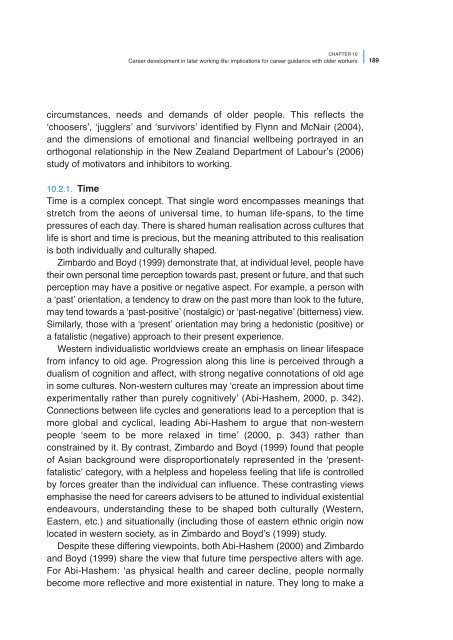Working and ageing - Cedefop - Europa
Working and ageing - Cedefop - Europa
Working and ageing - Cedefop - Europa
Create successful ePaper yourself
Turn your PDF publications into a flip-book with our unique Google optimized e-Paper software.
CHAPTER 10<br />
Career development in later working life: implications for career guidance with older workers 189<br />
circumstances, needs <strong>and</strong> dem<strong>and</strong>s of older people. This reflects the<br />
ʻchoosersʼ, ʻjugglersʼ <strong>and</strong> ʻsurvivorsʼ identified by Flynn <strong>and</strong> McNair (2004),<br />
<strong>and</strong> the dimensions of emotional <strong>and</strong> financial wellbeing portrayed in an<br />
orthogonal relationship in the New Zeal<strong>and</strong> Department of Labourʼs (2006)<br />
study of motivators <strong>and</strong> inhibitors to working.<br />
10.2.1. Time<br />
Time is a complex concept. That single word encompasses meanings that<br />
stretch from the aeons of universal time, to human life-spans, to the time<br />
pressures of each day. There is shared human realisation across cultures that<br />
life is short <strong>and</strong> time is precious, but the meaning attributed to this realisation<br />
is both individually <strong>and</strong> culturally shaped.<br />
Zimbardo <strong>and</strong> Boyd (1999) demonstrate that, at individual level, people have<br />
their own personal time perception towards past, present or future, <strong>and</strong> that such<br />
perception may have a positive or negative aspect. For example, a person with<br />
a ʻpastʼ orientation, a tendency to draw on the past more than look to the future,<br />
may tend towards a ʻpast-positiveʼ (nostalgic) or ʻpast-negativeʼ (bitterness) view.<br />
Similarly, those with a ʻpresentʼ orientation may bring a hedonistic (positive) or<br />
a fatalistic (negative) approach to their present experience.<br />
Western individualistic worldviews create an emphasis on linear lifespace<br />
from infancy to old age. Progression along this line is perceived through a<br />
dualism of cognition <strong>and</strong> affect, with strong negative connotations of old age<br />
in some cultures. Non-western cultures may ʻcreate an impression about time<br />
experimentally rather than purely cognitivelyʼ (Abi-Hashem, 2000, p. 342).<br />
Connections between life cycles <strong>and</strong> generations lead to a perception that is<br />
more global <strong>and</strong> cyclical, leading Abi-Hashem to argue that non-western<br />
people ʻseem to be more relaxed in timeʼ (2000, p. 343) rather than<br />
constrained by it. By contrast, Zimbardo <strong>and</strong> Boyd (1999) found that people<br />
of Asian background were disproportionately represented in the ʻpresentfatalisticʼ<br />
category, with a helpless <strong>and</strong> hopeless feeling that life is controlled<br />
by forces greater than the individual can influence. These contrasting views<br />
emphasise the need for careers advisers to be attuned to individual existential<br />
endeavours, underst<strong>and</strong>ing these to be shaped both culturally (Western,<br />
Eastern, etc.) <strong>and</strong> situationally (including those of eastern ethnic origin now<br />
located in western society, as in Zimbardo <strong>and</strong> Boydʼs (1999) study.<br />
Despite these differing viewpoints, both Abi-Hashem (2000) <strong>and</strong> Zimbardo<br />
<strong>and</strong> Boyd (1999) share the view that future time perspective alters with age.<br />
For Abi-Hashem: ʻas physical health <strong>and</strong> career decline, people normally<br />
become more reflective <strong>and</strong> more existential in nature. They long to make a

















